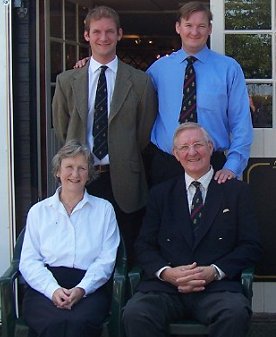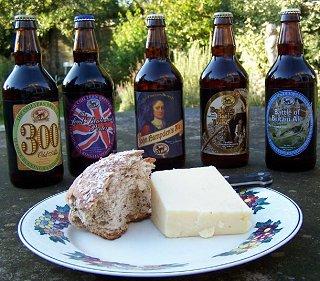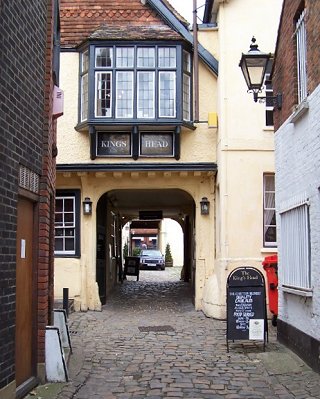 |
 |
|

|
|

|
 |
home
about
Protz
features
A-Z
books
|
|
Protz:
features
reviews
tastings
news & events
books
|

| |
The ups and downs of the Chiltern Brewery
by Willard Clarke, 09/05
It was when he fell off a ladder in his brewhouse that Richard Jenkinson knew it was time to hang up his mashing fork and let someone else take over. Richard was as sober as a judge at the time,
but after a long and varied life in engineering, City of London finance and close to 25 years running Chiltern Brewery, clambering up ladders at six in the morning was clearly no longer recommended.
So Richard and his wife Lesley (seated in picture, right) have taken a back seat at the brewery and allowed their two sons, George and Tom (standing), to take over the day-to-day running of the business, which now includes a
successful pub in the centre of Aylesbury.
Chiltern Brewery, based at Terrick in rural Buckinghamshire, mid-way between Aylesbury and Wendover, is one of the early micro-breweries that has survived the constant turmoil of recessions, the Beer
Orders and the rise of the pub groups. It has carved out a niche market that, as Richard observes with a wry smile, many others have copied: draught and bottled beers are sold from an on-site shop, there
are regular tours of the brewery, specialist beer shops and farmers' markets are supplied, and hand-crafted food have become an important part of the shop's activities.
|
|

|
Richard has been a member of the Campaign for Real Ale since the early 1970s and was also a keen home brewer, but his first career was with the family engineering firm in Sheffield. He built some giant,
15,000-gallon tanks for a Guinness brewery in Nigeria, which helped fire his interest in beer. "But I felt there must be more to life than welding," he says, "so I worked for 10 years in the City, advising banks."
In 1977 Richard and Lesley moved to the Bucks countryside, where he started to brew at home and won plaudits from his friends. When he failed in a bid to buy the family business in Sheffield, he sat
down to plan the rest of his life and decided to run a small brewery.
The Jenkinsons had moved to a new home at Terrick, which included some outbuildings that could be converted into a small brewery and shop. Richard met Bill Urquhart, the former head brewer at
Phipps in Northampton. Phipps had been a victim of the Watney's closure policy and Urquhart scratched a living advising aspiring brewers. Richard learnt the skills of technical brewing from Urquhart
and then launched the first Chiltern beers on the world in 1980.
"It was frontier territory," Richard says. "There were loads of free houses in the area but I quickly discovered that none of them was free at all. The beer market was declining, and the Falklands war was
followed by a recession. "In 1983, 53% of my turnover went in beer duty, followed by 15% VAT. At the end of that year, I just broke even."

|
|
With many other micros falling like ninepins, Richard carved out a new route to market. With Lesley's support, he started to do brewery tours - aided by county council "brown" tourist signs -- opened a shop that
sold both draught and bottled beers and then added such specialities as beer cheese, beer mustards and pickles, with beer bread made by a local craft baker (pictured, left).
He got beer into the British Rail pub at Marylebone station in London and spread to many other British Midlands station bars. Bottled beers, some of them bottle fermented, were added to give a new dimension
to the business.
|
Chiltern was ticking along nicely until the arrival of the turbulent 1990s. It seemed at first that small brewers would prosper as a result of the "guest beer" policy that flowed from the government's Beer Orders.
But when the national brewers sold off their pubs, Richard found he could no longer get into outlets owned by the new pub groups. "Suddenly, it was all about discounts and I couldn't make a living selling
beer at cost or less. Local pubs that had taken my beers and which were popular with drinkers told me they could no longer trade with me."
Richard battened down the hatches and concentrated on selling beer direct from the brewery and building sales of bottled beers. His elder son George, a chartered surveyor, who had worked in Devon
with a land agency that dealt with farmers, said Chiltern should sell beer at farmers' market and he joined the company to develop that side of the business.
Trade started to change dramatically in the new century. A massive order for an own-label bottled beer from a bank brought in much needed income and also convinced the Jenkinsons they needed to
expand the brewery. Expansion was aided by the arrival of Progressive Beer Duty, which cut the level of tax paid by small brewers to the government. Out of the blue, the National Trust, which owned the
medieval King's Head in Aylesbury, invited Chiltern to take over and run the pub (below, right).
And then Richard fell off the ladder.
Tom Jenkinson, the younger son, had a degree in engineering from Birmingham University and was in a dead-end job in banking in London. "Dad twisted my arm to come and take over the brewing," he says, but Richard didn't have to do too much twisting. Tom designed the new brewhouse and fermenting room, with a mash tun and copper feeding two 30-barrel fermenters. There is room for a third fermenter to be added.
The new kit has cut brewing time by several hours. It is also highly flexible: most brews are 10 barrel in length, but 13 to15 barrels are possible and shorter runs can accommodate special orders for own-label beers. Tom uses the finest malting barley, Maris Otter, supplied by Munton's, and the hop varieties are Challenger, Fuggles and Goldings, with Bramling Cross used in a new golden ale called Cobblestones.
|
|

|
The regular draught beers are Chiltern Ale, Beechwood and Three Hundreds Old Ale, while bottled beers include John Hampden's Ale - named after a 17th-century MP for Wendover and one of Oliver Cromwell's closest supporters during the Civil War - Battle of Britain Ale, Lord Lieutenant's Ale and Bodger's Barley Wine. Three Hundreds refers to ancient county divisions within Buckinghamshire: MPs who resign their seats still have to seek permission from the "Chiltern Hundreds".
Until the King's Head arrived on the scene, Chiltern was selling mainly bottled beer. The pub has dramatically changed the direction of the brewery.eH The enormous inn dates from 1455. It has vast cellars, a great cobbled courtyard where jazz concerts and plays are performed, and many beamed rooms with high-backed settles. Chiltern leases the site from the NT and a new company has been set up, with George and Tom as directors. George will shortly move in to rooms above the pub to manage the operation.
When they took over, the sons closed the pub to redecorate it. When they tentatively opened the doors, customers came flocking in. Beer engines had not been connected, so draught beer was served from polypins on the bar. The pub was drunk dry within 24 hours. There is such a clamour for Chiltern beers that the Jenkinsons are investing in 18-gallon kilderkins, as nine-gallon firkins can't cope with the demand.
The King's Head has a rigorous no smoking policy, one that has not harmed trade and has attracted new customers who can't stand smoky pubs. The brothers are convinced that a countywide smoking ban will benefit rather than hinder the pub trade. Simple dishes, such as Chiltern Cheese, Chiltern Ale, Chutney and Ham, or Chiltern Sausage and Cheddar Mash, make use of the brewery's speciality foods.
After a quarter century of hard pounding, the Chiltern Brewery is now beginning to reap a deserved reward. The Jenkinsons prove there is a genuine and growing demand for rich and characterful beers, which they are supplying on draught and in bottle.
Only one thing is missing as you tour the new spick and span brewery. There isn't a ladder to be seen.
|
|
home
about
Protz
features
A-Z
books
|